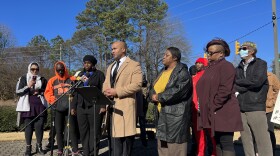Reverend Mycal Brickhouse has experienced a range of loss during the pandemic.
In September, one of his congregants and a church matriarch, Marie Gibbs, 95, died from complications with COVID-19.
With health restrictions in place, Brickhouse, the senior pastor at the historically African American Cary First Christian Church and director of Alumni Relations at Duke Divinity School, couldn’t carry out a traditional church funeral — an event he said would typically be packed with parishioners. Instead, Gibbs’ funeral took place graveside and attendance was limited.
“Her extended family wasn't able to be there, the church family — who she had sewn so many seeds into — were not able to be there,” Brickhouse said.
Another congregant John Spivey, 82, who Brickhouse describes as faithful and generous, died during the pandemic. And earlier last summer, Brickhouse lost his own grandmother, Patricia Brickhouse, at age 67. He said his grandmother spent nearly a month in a hospital ICU after contracting COVID. It’s a loss Brickhouse is still working through.
“The journey of grief is a day-by-day process. Some days, I'm able to function well, and then other days, there's this fog that exists in my mind,” said Brickhouse. “I'm not able to really think clearly.”
"Death has always been the last marker of dignity in our community and a place where we can affirm someone's humanity."Rev. Mycal Brickhouse
North Carolinians like Brickhouse have experienced significant loss over the past year. For some, that loss was acute — the death of a loved one, a neighbor, a friend. For others, the loss is perhaps more muted and amorphous — the loss of human touch, the absence of dinner with friends, and the low-lying but ever-present grief of being part of a greater community in mourning.
Nearly 12,000 North Carolinians have died from COVID-19 since the pandemic began in March 2020, leaving countless friends and families forced to adapt to honor their loved ones. From live-streamed funerals to in-person memorials with tight attendance, for many, the rituals that traditionally guide loved ones through the process of grief have been stripped away or put on hold. The rights of the deceased to be honored and celebrated publicly have been mired.
For Brickhouse, those public celebrations around death are rooted in a rich legacy.
“Death is attached to a high sense of honor and dignity in our community,” said Brickhouse about funeral rites in the African American Christian church. “Especially coming from an ancestry that is marked and filled with oppression from a dominant culture... Death has always been the last marker of dignity in our community and a place where we can affirm someone's humanity.”
Grief Interrupted
Throughout the pandemic, clinical psychologist and Director of the Portland Institute for Loss and Transition Robert A. Neimeyer has been studying the many ways the COVID-19 pandemic separates individuals from traditional rituals around grief. Rituals like the grand church funeral that would have been organized for a loyal church matriarch like Marie Gibbs.
Neimeyer and his colleague Sherman A. Lee published a research paper “Circumstances of the Death and Associated Risk Factors for Severity and Impairment of COVID-19 Grief” in the journal “Death Studies” this February. They built an accompanying tool called a “Pandemic Grief Scale” and found — based on their own metrics — that nearly 2/3 of the more than 800 mourners they studied who had lost a loved one from COVID reported a “clinically elevated level of grief that is associated with significant impairment of their ability to function in social, occupational and family roles.” The kind of grief that gets in the way of being present at work or helping your kids with homework.
“We can experience a couple of really difficult challenges in our grieving,” said Neimeyer about pandemic-era grief. “One is that we are left with a fund of traumatic memory, what we imagine the person is experiencing struggling for life on some machine, for example, the idea of the person alone suffering. These are haunting, troubling images, to somehow weave a story around, that provides any consolation at the time of their dying.”
Another way pandemic grief looks and feels different is the inability to be present and to care for loved ones in-person.
“We're left in a state of helplessness. And we sense our failure to be there for the other,” Neimeyer said. “And so we have both horror and guilt, that potentially complicate our grieving. And that leaves us with a fund of what psychologists would call unfinished business.”
Brickhouse understands that power of simply being present for one another during death.
“One of these things that was taught to us, even within seminary, was the ministry of presence — just being there,” Brickhouse said. “Families don't remember the things that we often say to them. They don't remember all the cards that may come in. But what they do remember is that there's this overwhelming sense of, ‘I'm not here by myself’.”
The rituals around death change across families, cultures, religions. But no matter the background, they often serve a similar role. As Neimeyer explains, they help provide a container for difficult emotion, ascribe meaning to the death, and they recognize a change in the status of the living. Ultimately, they help those who have lost loved ones rewrite their own stories, and the stories around the role the deceased played in their lives.
"Anything that honors our loved one, anything that keeps their stories alive, helps us in our grief."Robert A. Neimeyer
“Those functions of ritual are easily lost, or dramatically compromised, when what we have is some kind of improvised online memorial service and we sit shiva in front of our computers,” said Neimeyer.
Time To Pause
How can individuals find ways to fully embody and process the many layers and types of grief that they have experienced over the past year? As Neimeyer put it, it helps to find some “level of agency and meaningful participation” in the rituals around grief and death. He suggests finding a role within the memorial rituals of a loved one. That can be something as simple as participating in a small gathering to watch an online memorial service. Or hosting a family meal that features your loved ones’ favorite foods.
“Anything that honors our loved one, anything that keeps their stories alive, helps us in our grief,” Neimeyer said.
As for that broader grief that many have experienced over the past year — the grief over the absence of physical touch or the sadness around the nearly 12,000 deaths in this state alone, Neimeyer has a suggestion.
“It is hard to make space for pausing, and recognizing what we have lost, who we lost, and having an opportunity to learn the lessons that come from that,” said Neimeyer. “We now may be entering a period where it's more possible for us to take that pause. And courageous leaders — whether they are in faith communities, communities of color, governmental agencies, in all walks of life — have an opportunity to lead and model rituals of remembrance, as well as rituals of renewal, as we find a new way of moving forward in a world that is more unpredictable than we ever imagined it could be.”








